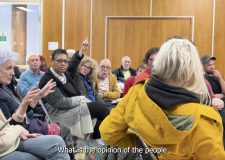Brighton war veteran wins legal battle with police
A Brighton war veteran has won a legal battle to force police to remove all references to him from a national database.
Three of Britain’s most senior judges found in favour of John Catt, 88, of Shepherds Croft, Withdean, at the Court of Appeal yesterday (Thursday 14 March). The judgment can be read in full here.
Mr Catt brought his case against Metropolitan Police Commissioner Sir Bernard Hogan-Howe and ACPO (the Association of Chief Police Officers).
The court was told that Mr Catt had been included in a database of political extremists after going on demonstrations in Brighton in support of Smash EDO.
He had been subject to surveillance by the state for ten years and information about him was gathered and kept by the National Public Order Intelligence Unit.
The judges found that the conduct of the police involved “a significant interference” with Mr Catt’s right to respect for his private life.
He said after the ruling: “I hope this judgment will bring an end to the abusive and intimidatory monitoring of peaceful protestors by police forces nationwide.
“Police surveillance of this kind only serves to undermine our democracy and deter lawful protest.”
The Court of Appeal judges said: “There is nothing to suggest that (Mr Catt) actively encourages criminality or public disorder, much less that he has engaged in behaviour of that kind himself.
“The systematic collection, processing and retention on a searchable database of personal information, even of a relatively routine kind, involves a significant interference with the right to respect for private life.
“It is striking that (Adrian Tudway, the National Co-ordinator for Domestic Extremism) does not say that the information held on Mr Catt over many years has in fact been of any assistance to the police at all.”
They also said: “John Catt over a long lifetime has been an ardent and frequent protestor against what he sees as a variety of forms of injustice.
“During that time he has attended many public demonstrations, most recently those organised by a group calling itself Smash EDO which campaigns against the operations on the outskirts of Brighton of a commercial manufacturer of weapons, EDO Defence Systems.
“Some of the core supporters of Smash EDO are prone to violence and criminal behaviour but it is accepted that Mr Catt has not been convicted of criminal conduct of any kind in connection with any demonstrations that he has attended.
“He seeks an order requiring the police to remove all references to him from the national database which contains reports on the activities of various protest groups including Smash EDO.
“Mr Catt’s complaints are that his personal information has been placed for an indefinite period on a database whose title suggests that he is an extremist who actively associates with people who have a propensity to commit crime and cause disorder despite the fact that he has never been convicted of such behaviour.
“Moreover, he says the rules, such as they are, governing the maintenance and operation of the database, do not make it clear what criteria are adopted for deciding whose details are to be included or when and under what circumstances they are to be removed.
A photograph of Mr Catt taken in 2007 was removed in July 2010 on the grounds that it was unnecessary to retain it but it is said that the other information about him will be retained indefinitely.
“Why that should be necessary when it is unnecessary to retain his photograph has not been satisfactorily explained.
“We do not doubt the importance to modern policing of detailed intelligence gathering and we accept the need for caution before overriding the judgment of the police themselves about what information is likely to assist them in their task.
“For present purposes that task is to obtain a better understanding of how Smash EDO is organised, to be in a position to forecast the place and nature of its next protest and to anticipate the number of people likely to attend and the tactics they are likely to adopt.
“It is not easy to understand how the information currently held on Mr Catt can provide any assistance in relation to any of those matters.”
Mr Catt’s solicitor Shamik Dutta, of Bhatt Murphy, said: “This judgment exposes the widespread and sinister nature of police surveillance of ordinary members of the public in this country.
“It also acts as a safeguard against the creeping criminalisation of peaceful protest.”
Mr Dutta added: “The Association of Chief Police Officers and the Metropolitan Police Commissioner have sanctioned this unlawful conduct for almost a decade and must be made accountable.”
Bhatt Murphy said: “There was astonishment in court when lawyers acting on behalf of the Commissioner and ACPO argued that if Mr Catt had wished to avoid his details being captured by the police he could have ‘covered his face’ while protesting.”
The case was heard in the Court of Appeal in London on Tuesday 29 and Wednesday 30 January after Mr Catt was defeated in the High Court.
The three judges who found in his favour yesterday included the Master of the Rolls, John Dyson, the second most senior judge in Britain.
Lord Dyson was sitting with Lord Justice Martin Moore-Bick and Lord Justice Richard McCombe.
The case included interventions on behalf of the Equalities and Human Rights Commission and the National Council for Civil Liberties (Liberty), both supporting Mr Catt’s case.





















